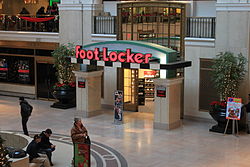Foot Locker, Inc.

The 1988–present logo
|
|

Foot Locker store, Tower City Center, Cleveland, Ohio
|
|
|
Formerly called
|
|
|---|---|
| Public | |
| Traded as | : FL S&P 500 Component |
| Industry | Clothing |
| Predecessor | F. W. Woolworth Company |
| Founded |
|
| Founder | F. W. Woolworth and Santiago Lopez |
| Headquarters | 330 West 34th Street, New York City, New York, United States |
|
Number of locations
|
3,363 stores |
|
Area served
|
Worldwide |
|
Key people
|
(President & CEO - USA) |
| Brands |
|
| Revenue |
|
|
|
|
|
|
|
| Total assets |
|
| Total equity |
|
|
Number of employees
|
44,113 |
| Website | www |
Foot Locker Retail, Inc. is an American sportswear and footwear retailer, with its headquarters in Midtown Manhattan, New York City, and operating in 28 countries worldwide.
Although established in 1974, and founded as a separate company in 1988, Foot Locker is a successor corporation to the F. W. Woolworth Company (“Woolworth’s”), as many of its freestanding stores were former Woolworth's locations. The company operates the eponymous “Foot Locker” chain of athletic footwear retail outlets (along with “Kids Foot Locker” and “Lady Foot Locker” stores), and other athletic-based divisions including Champs Sports, Footaction USA, House of Hoops, and Eastbay/Footlocker.com, which owns the rights to Final Score. The company is also famous for its employees' uniforms at its flagship Foot Locker chain, resembling those of referees.
According to the company's filings with the SEC, as of January 28, 2017, Foot Locker, Inc. had 3,363 primarily mall-based stores in the United States, Canada, Europe, and Asia. Nearly 70% of its product is from Nike.
In 1963, the F.W. Woolworth Company purchased the Kinney Shoe Corporation and operated it as a subsidiary. In the 1960s, Kinney branched into specialty shoe stores, including Stylco in 1967, Susie Casuals in 1968, and Foot Locker on September 12, 1974 (in Puente Hills Mall in City of Industry, California). Woolworth also diversified its portfolio of specialty stores in the 1980s, including Afterthoughts, Northern Reflections, Rx Place, and Champs Sports. By 1989, the company was pursuing an aggressive strategy of multiple specialty store formats targeted at enclosed shopping malls. The idea was that if a particular concept failed at a given mall, the company could quickly replace it with a different concept. The company aimed for 10 stores in each of the country's major shopping malls, but this never came to pass as Woolworth never developed that many successful specialty store formats.
...
Wikipedia
